Homeopathic Care for Cats and Dogs
A growing number of veterinarians are turning to homeopathic veterinary medicine as a safe
and effective alternative to conventional veterinary practice.
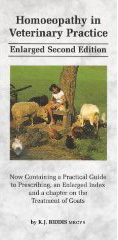 Don Hamilton, DVM - "Unfortunately too many people, being
unaccustomed to a holistic concept of health, use homeopathic
remedies in a decidedly allopathic manner; i.e., they choose a homeopathic
remedy the way they would choose a drug, without taking into account
the totality of the patient's symptoms and conditions."
Don Hamilton, DVM - "Unfortunately too many people, being
unaccustomed to a holistic concept of health, use homeopathic
remedies in a decidedly allopathic manner; i.e., they choose a homeopathic
remedy the way they would choose a drug, without taking into account
the totality of the patient's symptoms and conditions."
Dr. Hamilton tells you what you need to know to treat acute and minor health problems
homeopathically (chronic illness needs to be treated by an experienced
veterinary homeopath): how to take a case, choose a remedy, handle and
administer remedies, select potency and repetitions, and recognize signs
of a cure or partial cure as well as the signs of suppression or a non-curative
aggravation (contrary to popular belief, not every aggravation signals
a positive healing crisis). He also covers the very important subject
of eliminating obstacles to a cure (e.g., low-quality processed foods,
vaccinations, unnecessary stress).
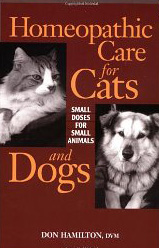 Dr. Hamilton also includes a Materia Medica that, while brief, is
very accurate. Those with a serious interest in homeopathy will probably
want to invest in at least one comprehensive materia medica and repertory
though. Like the previous reviewer, I disagree with Dr. Hamilton's views
on purebred dogs. IME, it's simply a myth that mixed breeds today are
inherently healthier than purebred dogs. Our German Wirehaired Pointers
are naturally reared and in excellent health!
Dr. Hamilton also includes a Materia Medica that, while brief, is
very accurate. Those with a serious interest in homeopathy will probably
want to invest in at least one comprehensive materia medica and repertory
though. Like the previous reviewer, I disagree with Dr. Hamilton's views
on purebred dogs. IME, it's simply a myth that mixed breeds today are
inherently healthier than purebred dogs. Our German Wirehaired Pointers
are naturally reared and in excellent health!
This book is an understandable introduction to veterinary homeopathy
for the beginner. Dr. Hamilton explains the history and theory of homeopathy
in such a way that virtually anyone can grasp the basic principles.
However, this is not just an introductory text. It is also a great reference
tool for the more experienced animal guardian. Part One covers Homeopathic
Principles, including an introduction, the nature of disease and the
nature of cure. Very important tenets of this modality, and very different
from allopathic medicine. Part Two provides step-by-step guidance on
treating animals with homeopathy. It also explains when NOT to treat
your animal without the guidance of an experienced homeopathic practitioner.
While Part Three discusses vaccinations and the role they play in the
health and illness in our companion animals. Part Four is the Materia
Medica, which describes the individual remedies.
Homeopathy for the Herd
C. Edgar Sheaffer, V.M.D
Over the past 50 years, a dangerous set of technologies has crept into
beef and dairy farms and ranches. Technologists have succeeded in pushing
the pounds of milk that can be extracted from a cow higher and higher
and throwing pounds of weight on beef cattle faster. But it came with
a price. The average age of dairy cow 'burnout' has dropped for almost
a decade. Infections are rampant. New diseases and health maladies have
appeared. Drug use and vet bills have skyrocketed. The healthfulness
of milk and beef has been questioned.
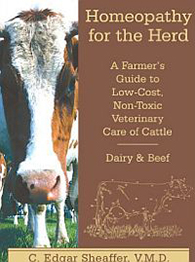 In this breakthrough book subtitled A Farmer's Guide to Low-Cost,
Non-Toxic Veterinary Cattle Care, Dr. Sheaffer passes along his hard-learned
knowledge - in language farmers can understand - of how to care for
the herd in a healthy, holistic manner. Utilizing homeopathy - an effective,
non-toxic form of medicine derived from herbs and other natural substances
- as well as other healing alternatives, he will teach you to truly
understand the cause behind a disease condition, and then how to treat
the entire animal for that condition.
In this breakthrough book subtitled A Farmer's Guide to Low-Cost,
Non-Toxic Veterinary Cattle Care, Dr. Sheaffer passes along his hard-learned
knowledge - in language farmers can understand - of how to care for
the herd in a healthy, holistic manner. Utilizing homeopathy - an effective,
non-toxic form of medicine derived from herbs and other natural substances
- as well as other healing alternatives, he will teach you to truly
understand the cause behind a disease condition, and then how to treat
the entire animal for that condition.
Using case studies and practical examples from both dairy and beef
operations, Dr. Shaeffer covers such topics as: creating a holisitic
operation; organics and homeopathy; prescribing; mastitis and fertility-related
problems; and the Materia Medica, keynotes and nosodes. Also includes
a convenient section that lists specific conditions and remedies.
Dr. C. Edgar Sheaffer is one of the top veterinarians in North America
practicing alternative care for ruminants. He lectures widely on innovative,
low-cost, natural methods of maintaining herd health. He has consulted
with operations small and large, and for many years has conducted herd
checks for the Amish and Mennonite farmers of east-central Pennsylvania.
He studied in Gettysburg College and Penn State, ultimately graduating
from the University of Pennsylvania School of Veterinary Medicine. His
life changed when he attended a seminar by British veterinary homeopath
George Maclod, who later became Dr. Sheaffer's mentor in this specialized
branch of veterinary medicine.

Homeopathic First Aid for Animals
Tales and Techniques from a Country Practitioner
The gentle and effective qualities that have made homeopathy such
a popular remedy for humans make it the perfect treatment method for
animals as well. This reader-friendly guide is an A-to-Z reference for
treating almost any emergency that may befall our beloved animal companions.
Practical clinical instruction in homeopathy and first aid is included
for each condition, from broken bones to diarrhea, from poisoning to
fleas. Special sections discuss caring for orphaned young animals and
understanding how homeopathic medicines work. It makes the perfect guide
for those who want to give animals the non-threatening, natural care
they need.

Homeopathy for Animals applies to many different animal species,
including pets, horses, barnyard animals, even birds and reptiles. Real-life
anecdotes from the author's 20 years of veterinary experience treating
household pets and farm and wild animals make Homeopathy for Animals
as entertaining as it is useful. The cases in this book show homeopathy
in action on a level everyone can relate to, and the demonstration of
how what is observed is turned into the means of remedy selection is
particularly useful. This is a book that will certainly find a
place in the market.
Goats thrive on fully organic natural care
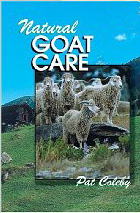 As natural browsers, they have higher mineral requirements than other domestic animals, so diet is
a critical element to maintaining optimal livestock health. In Natural
Goat Care, consultant Pat Coleby shows how to solve health problems
both with natural herbs and medicines and the ultimate cure, bringing
the soil into healthy balance. Topics include: correct housing and farming
methods; choosing the right livestock; diagnosing health problems; nutritional
requirements and feeding practices; vitamins and herbal, homeopathic
and natural remedies; psychological needs of goats; breeds & breeding
techniques. An invaluable resource for anyone with goats.
As natural browsers, they have higher mineral requirements than other domestic animals, so diet is
a critical element to maintaining optimal livestock health. In Natural
Goat Care, consultant Pat Coleby shows how to solve health problems
both with natural herbs and medicines and the ultimate cure, bringing
the soil into healthy balance. Topics include: correct housing and farming
methods; choosing the right livestock; diagnosing health problems; nutritional
requirements and feeding practices; vitamins and herbal, homeopathic
and natural remedies; psychological needs of goats; breeds & breeding
techniques. An invaluable resource for anyone with goats.
Homeopathic Treatment of Small Animals
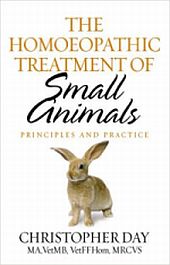 A comprehensive survey of the principles and practice of the homeopathic treatment of domestic animals,
with guidance for small pets and birds. For veterinarians, breeders
and owners. Written by veterinarian Christopher Day, who has used homeopathy
to successfully treat pets, farm and zoo animals since 1972. In
this comprehensive guide, you will discover how small pets - including
dogs, cats, guinea pigs, rabbits, rodents, reptiles, fish and birds
- can benefit from homeopathic remedies. There is essential information
about the principles and practice of homeopathy, as well as grounded
guidance for owners, breeders and veterinary surgeons. Helpful advice
is given on getting started with the remedies, on homeopathic first
ad and on treating specific diseases. Many fascinating case studies
show how homeopathy can make an important contribution to the wellbeing
of small animals. Christopher Day is a qualified vet who runs a natural
medicine referral center in Oxfordshire, UK. He has successfully treated
all types of animals with homeopathic medicine, including horses, farm
animals, zoo and wild animals of many types. He is Veterinary Dean to
the Faculty of Homeopathy and Honorary Secretary of the British Association
of Homeopathic Veterinary Surgeons.
A comprehensive survey of the principles and practice of the homeopathic treatment of domestic animals,
with guidance for small pets and birds. For veterinarians, breeders
and owners. Written by veterinarian Christopher Day, who has used homeopathy
to successfully treat pets, farm and zoo animals since 1972. In
this comprehensive guide, you will discover how small pets - including
dogs, cats, guinea pigs, rabbits, rodents, reptiles, fish and birds
- can benefit from homeopathic remedies. There is essential information
about the principles and practice of homeopathy, as well as grounded
guidance for owners, breeders and veterinary surgeons. Helpful advice
is given on getting started with the remedies, on homeopathic first
ad and on treating specific diseases. Many fascinating case studies
show how homeopathy can make an important contribution to the wellbeing
of small animals. Christopher Day is a qualified vet who runs a natural
medicine referral center in Oxfordshire, UK. He has successfully treated
all types of animals with homeopathic medicine, including horses, farm
animals, zoo and wild animals of many types. He is Veterinary Dean to
the Faculty of Homeopathy and Honorary Secretary of the British Association
of Homeopathic Veterinary Surgeons.
Dogs Homeopathic Remedies
George MacLeod
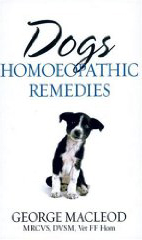
This book is highly recommended by the Journal of The British Homeopathic Association.
and is a good resource for those with some experience in the
use of homeopathic remedies. It's definitely not the first book on homeopathy
you should be reading, as it will not tell you how to take a case, choose
the most appropriate remedy, select potency and repetitions, and recognize
signs of a cure or partial cure as well as the signs of suppression
or a non-curative aggravation. For an excellent introduction to veterinary
homeopathy, check out books by Dr. Don Hamilton and Dr. Christopher
Day. Dr. Macleod's book lists some of the major remedies for a large variety
of canine ailments (arranged according to body system) with a brief
description of the symptom picture that would call for a particular
remedy. Of course the list of remedies is not exhaustive and this book
is not intended to substitute for looking up the remedies in a comprehensive
materia medica.

Veterinary Materia Medica and Clinical Repertory
G. MacLeod
The materia medica catalogs only about 280 remedies (listed alphabetically).
Each entry includes information about the remedy's origin, the major
actions on the body systems, and some of the most common uses of the
remedy. While the entries for some of the major remedies span over a
page, other entries take up only a small paragraph, and Dr. Macleod
concedes that there is much more that could be written about each remedy's
actions and indications.
Clearly his book is meant to be used in conjunction
with a more comprehensive standard materia medica. The materia medica
of the nosodes also includes a guide to using
nosodes therapeutically as well as prophylactically (though the effectiveness
of the latter is somewhat controversial in classical homeopathy circles).
Finally there is a brief clinical repertory that lists common ailments
(no detailed lists of symptoms as is the case with more comprehensive
standard repertories) and some of the remedies that may be indicated
for their treatment. The list of remedies is by no means exhaustive,
so further research may well be necessary to find the correct remedy.
Treatment of Horses by Homeopathy
George MacLeod
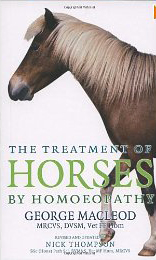
This is an excellent book if you are considering using
homeopathic treatment for your horse. Most common and some uncommon horse ailments
are covered and suggested remedies and dosages are given. The only reason
I did not give this book 5 stars is that the author assumes the reader
has more knowledge of medical terminology than it is likely the average
reader will have. It helps to have a good medical dictionary at you
elbow when you read this book.
Browse through the Holistic
Animal Health bookshelf for additional wonderful Books and
video on Natural Health Care for Animals, including: Home Remedies for
Dogs and Cats, Aromatherapy, use of herbs in the holistic care of dogs
and cats, Raising Healthy Pets: Insight of a HolisticVeternarian, Veterinary
Chinese Medicine for Dogs and Cats, Animal Talk, and much more.
Natural Health Care for Your Bird
Birds are ideal subjects for holistic care. They are especially sensitive
to emotional and physical stresses. Based on what we have learned from
wild birds and studies completed in the last 10-20 years, this book
will help you provide your bird with a longer, healthier life. Each
beautifully illustrated chapter is written from two viewpoints, one
from the leading holistic avian veterinarian and the other from a bird owner's viewpoint. Holistic
care is defined and the value of this type of care in relation to conventional
western medicine is discussed. Other interesting topics include the
physical bird, the emotional bird, nutrition and special holistic therapies.
In HOLISTIC CARE FOR BIRDS, authors McCluggage and Higdon address preventative
care as well as spiritual and emotional healing. They begin with a brief
overview of 'bird keeping' - Different birds have different needs.. Not
all birds like to be petted while others may become miserable without
constant affection. Sometimes the difference is species specific, other
times it is related to the bird's treatment by previous owners.
Obvious physical problems may send you scrambling to the vet, but
there are remedies you can keep on hand to deal with life's stresses
and less serious physical injuries. For example, according to the authors,
mild chamomile tea in the bird's water bowl offers a soothing aperitif
following a bad 'out-of-cage' experience with the family dog or as a
palliative for feather picking. Aloe juice used to treat human skin
problems as well as Vitamin E and C can also be used to address bird
wounds inflicted by cage mates.
The authors address a range of treatments for ailments as diverse
as sore feet and broken feathers to heart disease. They do not eschew
veterinary care, indeed McCluggage is a DVM as well as a Certified Veterinary
Acupuncturist. Higdon has written a number of books on happy, healthy
pets (Lovebirds, Quaker Parrots, etc.). The book includes a section
on nutrition, as the best health care involves diet.
Homeopathy
Today includes inspiring articles and testimonials from
veterinarians and others who have improved their animal's health or
saved their lives with homeopathy. If you';re interested in homeopathy,
this is one magazine to get. Homeopathic remedies may be bought over
the counter in all countries, and are being used to treat both human
beings and animals. Each month it features articles and information
from todays leading homeopaths. I wait for mine to arrive each month
and then read it cover-to-cover! Published six times a year, each issue
features articles by some of the world's best homeopaths on self-treatment
for common ailments (e.g., hay fever, ear infections, and the flu);
on the homeopathic treatment process and the philosophical underpinnings
of homeopathy; and on specific remedies or diseases. Readers are kept
up to date on the latest topics in homeopathic education, legislation
that impacts homeopathic practice, conferences and workshops, reviews
of new books, and much more. And each issue also contains at least one
or two cure stories -- contributed by both practitioners and patients
-- of their successful experiences with homeopathic treatment. In sum,
there is material in each issue of Homeopathy Today
that will interest everyone -- from patients to experienced practitioners.
Highly recommended for laypeople, students, and professionals alike.

Vaccine Free Prevention and Treatment of Infectious Contagious Disease with Homeopathy
Homeopathy offers an inexpensive and effective treatment plan which
can more radically improve the status of health on this planet for its
human inhabitants than any other system of medicine has so far.
Not only is the information herein useful for the treatment of infectious
contagious diseases but it also lays a foundation for deeper study into
chronic disease. The philosophical chapters introduces the basic tenants
of homeopathy, and overview of the immune system, and discusses vaccine
injury in the immune system in the light of homeopathic philosophy.
The clinical chapters cover: childhood eruptive disease such as chickenpox,
measles, and scarlet fever: diseases that have a historical significance
and/or raise concerns due to biological warfare, smallpox, anthrax,
and plague: more common household illness of Haemophilus influenza,
otitis media, influenza, mononucleosis, and pneumonia: sexually transmitted
diseases of herpes, genital warts, gonorrhea, syphilis, AIDS and hepatitis,
accompanied with an in depth look at the expression of human psychology
associated with these diseases: five of the most common tropical diseases,
yellow fever, typhoid, dengue fever, cholera and malaria providing sufficient
information for prevention and treatment:. The remaining chapters cover
homeopathic prevention and treatment for rabies, tetanus, diphtheria,
mumps, and tuberculosis.
Are there Homeopathic Vaccines?
Many people have stopped vaccinating, but have started using homeopathic
protection on an on-going basis. These remedies are called
nosodes, and are homeopathic preparations of the
different animal diseases made from the tissues of a diseased animal. Therefore
they have not only the organism, but an animal's response to the organism.
Some are using nosodes for each disease, and others are using combinations
of all the diseases. This is still operating from a fear of getting something,
rather than a proactive stance of "let's become very healthy so that even
if we are exposed to a communicable disease, we will not get that ill."
There is a lot of evidence for the success of using homeopathic remedies
in people over the last 200 years to protect them when an epidemic is going
on, but few doctors recommended on-going prevention, and certainly not repeated
throughout the life of the person or animal.
Homeopathic Prevention Schedule
Dr. Chambreau DVM vaccination guideline
recommendation is not to use nosodes this way. some people need to
for their peace of mind or sometimes circumstances dictate the need for
nosode protection. This schedule is for use in HEALTHY animals only, preferably
not on any other treatments, especially homeopathic. I recommend ONLY using
in young, healthy animals (0-1 years old)
One dose is 3 granules of the nosodes (homeopathic vaccine) given orally:
At any age:
- 1. Give one dose of 30c
- 2. One week later, give one dose of 30c.
- 3. One week later, give one dose of 200c and repeat in a month.
- 4. One month later, give one dose of 1M, and repeat in six months
if needed. Dogs: Usually only parvo and distemper. Cats only need feline
panleukopenia. Puppies and kittens: Start at any age, even 3-4 weeks
old, and even at one day if in a poor environment. Example: 3 weeks:
30c Parvo; wk 4: 30c Parvo; wk 5: 200c Parvo; wk 6: 30c Dist; wk 7:
30c Dist; wk 8: 200c Dist; wk 9: wait; wk 10: 200c Parvo; wk 11: wait;
wk 12: 200c Dist; wk 13: wait; wk 14: 1M Parvo; wk 15: wait; wk 16:
1M Dist. Repeat 1M in 6 months and one year, if you feel it is needed.
I recommend using these single nosodes rather than the combinations.
Remember that nosodes are very useful in epidemics, given right after
exposure. Vaccination is an important issue to grapple with, and I encourage
you to read more, and listen to tapes on conferences. Make your own
decisions and decide what you can decisions you can support in your
clients.
Dr. Christina Chambreau D.V.M. is the founder of the Academy of Veterinary
Homeopathy and is on the faculty of the National Center for Homeopathy
Summer School. She teaches and lectures at conventions, schools, clubs and
to anyone who is concerned about improving the health of animals. She graduated
from the University of Georgia Veterinary College in 1980 and has practiced
veterinary homeopathy since 1983.
Holistic animal health articles by Dr. Christina Chambreau D.V.M.